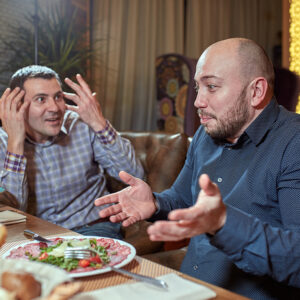We see it all around us. People are losing their tempers at restaurants, in grocery stores, on planes and on the road. Something is happening to our country. More and more people are giving in to anger quickly and easily. What does this say about us as a people? What does it mean for our future?
The pandemic is definitely a factor in all of this. After lockdowns, social distancing, and masks, we have become wary of one another. But it seems to go deeper than this. In order to understand this fully, we need to combine perspectives of psychology and political philosophy; no one field of study can encompass all of the complexities of this phenomenon.
We learn from psychologists like Dr. Ryan Martin, who draws on Deffenbacher’s theory of anger, that there are three causes of anger: trigger events, individual characteristics, and an individual’s cognitive appraisal of a situation. Since different people react to the same situations differently, the trigger event by itself is not the cause of an anger episode. My wife was looking at grapes in a grocery store recently, when a man charged toward her, furious that she had briefly pulled some grapes out of a bag to look at them. He was shouting and waving his hands around wildly. He was on the verge of becoming violent. Not everyone finds grapes to be a trigger event.
Then there are an individual’s characteristics. This is related to personality traits. For example, as Dr. Martin points out, a overly competitive person might be triggered by one thing, and a narcissist might be triggered by another. And finally, there is the decisive impact of the cognitive appraisal. This is the key. According to this theory of anger, a person gets angry when something is evaluated as blameworthy, unjustified, or punishable.
But our question is why anger is generally increasing in the country, not just why an individual might get angry. I suggest that the political polarization that has been encouraged by demagogues and spread by a pliable social media is encouraging more people to see the behavior of others as blameworthy, unjustified, or punishable
In recent years, we have been inundated by what I would call a rhetoric of accusation. People defined as “the other” have been portrayed as threatening and evil, and this means that trust has broken down among people and groups. One consequence of this is that people have begun to think that listening to others is unnecessary. Why should we listen to those who simply want to hurt us? And if people stop listening to one another, the chance for violence increases.
This also contributes to the growth of the conspiracy mentality. If you feel you are surrounded by “other” people who cannot be trusted and who wish you harm, you are vulnerable to notions that there are secret plans by covert groups who wish you harm, and this means almost anything can be a trigger event. You are already pre-disposed to see “the other” as a threat to your freedom or your way of life. It follows from this that there are no unimportant encounters. Every contact with “the other” is a pivotal event that demands an aggressive response. Everything is at stake. Anger is always justified.
What follows is a breakdown of civility, social bonds, and even respect for law that once made a sense of community possible.
What can we do to address this? Passing new laws will not make a difference. We cannot legislate this away. The challenge we face right now is much more fundamental than this. In an 1856 speech, Abraham Lincoln said that “In this and like communities, public sentiment is everything. With public sentiment, nothing can fail; without it nothing can succeed. Consequently he who moulds public sentiment goes deeper than he who enacts statutes or pronounces decisions.” We need our opinion leaders in politics, religion, business, education, sports, social media and entertainment to use their positions of influence to change the tone of contemporary public discourse. We need a new rhetoric of engagement. We need our opinion leaders to provide models of this new rhetoric, which means that they need to show us it is possible to disagree with others without calling their motives into question or simply condemning them as evil. We need public examples of civil disagreement.
If public sentiment can be changed today, then we can pull back from the brink and listen to one another. We can avoid becoming a country enraged.

